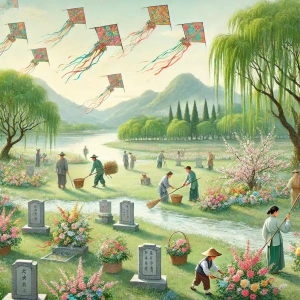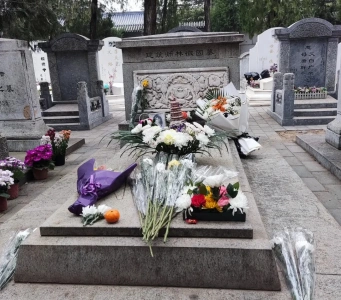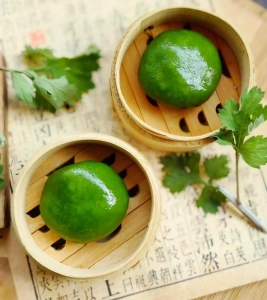
Qingming Festival (清明节), also known as Tomb Sweeping Day, is one of China’s most significant traditional holidays. This festival is deeply rooted in Chinese culture and has been observed for over 2,500 years. It is a time for families to remember and honor their ancestors by visiting gravesites, making offerings, and engaging in various customs that reflect filial piety.
The Qingming Festival in 2025 falls on April 4, Friday. Since it is a public holiday in China, many people take advantage of the long weekend to visit their ancestral graves or travel for spring outings.
The origins of Qingming Festival date back to the Zhou Dynasty (1046–256 BC). However, it became an official festival during the Tang Dynasty (618–907 AD) when Emperor Xuanzong decreed that people should formally honor their ancestors during this period.
Qingming Festival is closely associated with the ancient Hanshi Festival (Cold Food Festival), a day when people refrained from using fire for cooking. Over time, the two traditions merged, and today, Qingming is primarily recognized for its tomb-sweeping customs and spring-related activities.
One of the most important customs of Qingming Festival is tomb sweeping (扫墓). Families visit cemeteries to clean the graves of their ancestors, remove weeds, and offer food, tea, wine, and incense as a sign of respect.

While Qingming Festival is not known for elaborate feasts, certain foods are traditionally eaten:

Qingming Festival is also a time to enjoy spring outings (踏青). Families and friends go to parks, fields, and countryside areas to admire the blooming flowers and lush greenery. Flying kites is another popular activity, as it is believed to bring good luck and ward off evil spirits.
Since Qingming Festival is based on the solar calendar, it usually falls on April 4 or 5. Below are the Qingming Festival dates from 2016 to 2025:
Tourists visiting China during Qingming Festival can experience the cultural traditions by:
Qingming Festival is a public holiday in mainland China, Hong Kong, Taiwan, and Macau. In China, it is typically a three-day holiday, which allows families to travel and pay their respects to their ancestors.
Public Holiday Period in China (2025):
During this period:
Qingming Festival is also observed by Chinese communities worldwide. In places with significant Chinese populations, such as Taiwan, Hong Kong, Malaysia, Singapore, and Thailand, families continue to honor their ancestors.
Similar festivals in other cultures include:
The name comes from the main tradition of the festival, where families clean and maintain their ancestors’ gravesites.
While it is a time for reflection and remembrance, Qingming also has joyful aspects, such as spring outings, kite flying, and picnics.
Yes! Visitors are welcome to observe ceremonies, try seasonal foods, and learn about the cultural significance of the festival.
Learn dates, customs, and celebrations of major Chinese holidays to effectively plan your vacations and trips.
